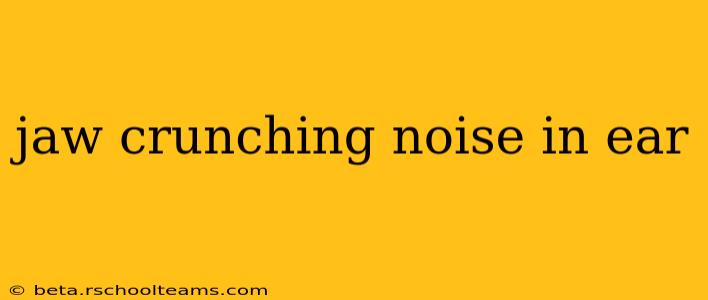Experiencing a jaw crunching noise in your ear can be unsettling. This unusual sound, often accompanied by pain or discomfort, can stem from various sources, ranging from relatively benign to more serious conditions. Understanding the potential causes is the first step in addressing this issue and finding relief. This comprehensive guide explores the possible reasons behind this symptom and provides insights into when professional medical attention is necessary.
What Causes a Jaw Crunching Noise in My Ear?
The connection between your jaw and your ear might seem surprising, but they are closely related anatomically. The temporomandibular joint (TMJ), connecting your jawbone to your skull, is located just in front of your ear. Issues within this joint are a primary cause of jaw-related sounds and sensations in the ear.
Temporomandibular Joint Disorder (TMJ)
TMJ disorder is a common culprit behind jaw crunching noises in the ear. The TMJ is a complex joint, and problems with its cartilage, ligaments, or surrounding muscles can lead to clicking, popping, or grinding sounds. This can be accompanied by pain, limited jaw movement, headaches, and even earache.
Other Potential Causes
While TMJ is frequently implicated, other factors could contribute to a crunching noise in the ear that seemingly originates from the jaw:
- Osteoarthritis: Degenerative joint disease affecting the TMJ can cause cartilage breakdown, leading to bone-on-bone grinding and a crunching sound.
- Eustachian Tube Dysfunction: This affects the tube connecting the middle ear to the back of the throat. While not directly related to the jaw, dysfunction can cause pressure changes that might feel like a clicking or crunching in the ear.
- Muscle Spasms: Tight or spasming muscles in the jaw or surrounding area can also create clicking or grinding sounds. Stress and tension are common triggers.
- Rare Causes: In rare instances, more serious conditions like tumors or bone fractures could manifest with similar symptoms.
Is a Jaw Crunching Noise in My Ear Serious?
The seriousness of a jaw crunching noise in your ear depends entirely on the underlying cause and associated symptoms. A simple clicking sound with no pain is usually less concerning than persistent grinding accompanied by significant pain, headaches, or limited jaw movement.
When to See a Doctor
It's crucial to seek medical attention if you experience:
- Severe pain: Intense or persistent pain in the jaw, ear, or head.
- Limited jaw movement: Difficulty opening or closing your mouth fully.
- Locking jaw: Inability to open or close your mouth.
- Facial asymmetry: Noticeable unevenness in your face.
- Hearing loss: Any change in your hearing ability.
- Fever: A sudden onset of fever.
How is a Jaw Crunching Noise in My Ear Diagnosed?
Diagnosis typically involves a thorough physical examination of the jaw and ear. Your doctor will assess your jaw's range of motion, check for tenderness, and listen for sounds during jaw movement. Imaging studies like X-rays or MRIs may be used to visualize the TMJ and rule out more serious conditions.
What Treatments are Available for a Jaw Crunching Noise in My Ear?
Treatment depends on the underlying cause. For TMJ disorders, options range from conservative approaches to more invasive procedures:
- Conservative Treatments: These include pain relievers, muscle relaxants, heat or ice packs, physical therapy, and stress management techniques.
- Splints or Mouthguards: These devices can help realign the jaw and reduce strain on the TMJ.
- Invasive Treatments: In severe cases, surgery or other procedures might be considered.
Remember: This information is for general knowledge and does not constitute medical advice. Always consult a healthcare professional for diagnosis and treatment of any medical condition. They can accurately assess your situation, determine the underlying cause of your jaw crunching noise in your ear, and recommend the most appropriate course of action.
